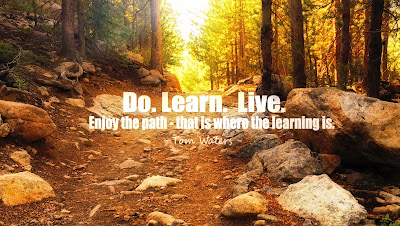17 Actions for Lead Learners
The most powerful learners take ownership. They are passionate about an idea or topic. They pursue it with single-minded attention. They have no excuse to stop them. They are emotionally invested. They take the lead in their own learning.
The same could be said for leaders of learning. They take on leadership like it is learning. Every interaction is a chance to learn about their organization. They use learning as the fuel that drives improvement. They have focus - almost to a fault. Their passion is contagious. They make their work their own. They make it a masterpiece. They take the lead in learning.
Here are 17 actions for lead learners:
1. Enjoy the journey. Processes are more important than products because processes involve people. Enjoy the processes.
2. See challenges in 3-D.
 Challenges are to be solved. But behind each challenge,there is also a dimension that belies some area for growth in your organization.
Challenges are to be solved. But behind each challenge,there is also a dimension that belies some area for growth in your organization.
3. Listen.
Probably the most powerful skill of a leader.
4. Serve others.
Develop the habit of service. Each week find a new person or team to serve. How can you support them? How can you listen to them? What can you do to make it easier for them to be effective?
5. Serve and observe.
Service is also an opportunity to learn. How does the person or team respond? Their response will tell you volumes about what challenges and strengths are in the team.
6. Seize moments.
Anything unique is worth seizure. Any unique or out
lier behavior, a comment, an idea, or a result has the potential for learning. Seize it by stopping, paying it attention, and following up. The curiosity is contagious.
7. Have a voice.
Have something to say. Have a message. It will improve interactions. It will promote learning. Your voice can build collective purpose. Your vision can be communicated daily in small ways. They will add up.
8. Have a question.
Always have questions crafted and prepared. You'll never (almost never) be caught off-guard. You'll always be positioned for learning.
9. Shred traditional agendas.
Instead of planning meetings with traditional agendas with topics. Plan them with questions. It will poise you to listen rather than speak. It models good instruction. It models good leadership. It is good learning.
10. Hold digital meetings.
An ongoing shared document, wiki, or other digital idea space can provide the real thinkers on campus with a springboard for ideas. And it can be the groundwork for goal-setting, professional development, and instructional rounds.
11. Embrace two-minute meetings.
If you have to transmit information, which you do, then do it with two-minute meetings. It opens up time for learning and work.
12. Embrace the 4-question meeting.
Meet quarterly with team leaders and ask four questions. What are you learning about instruction? What mistakes have you made? What do you want to improve in your class? What do you want to improve on campus?
13. Invite challenge from others.
It's scary to be challenged. Maybe you've experienced this thought: How do you question me, I'm the leader! You probably haven't, but many school leaders do. That mindset really says, I'm afraid that I'm not the smartest. It is a fixed mindset. Whereas, challenge promotes new ideas and growth. Invite it.
14. Create challenges for yourself.
Challenge yourself to do something new. Maybe start a blog or join Twitter conversations like #HackLearning or #divergEd. Try to meet a principal from another district and expand your learning network. Write a grant. Video yourself in conferences.
15. Create challenges for others.
View them as opportunities for shared leadership. Actively seek and create avenues for others to share in leadership roles.
16. Observe others' challenges.
When you empower others to take on leadership roles, watch and learn. How are their actions and decisions a mirror of your own? Can you find new ways to approach your own role? Learn together. It builds powerful relationships.
17. Support others' challenges.
It's simply good leadership to support others. Even more, it's great learning. You get to take an objective perspective on the challenges that other leaders are facing.
Hopefully, these 17 strategies and tasks can help you as lead learner or leader of learning. They're designed to ignite passion and fuel a culture of learning.
For learning ideas for teachers, take a look at this blog TeamTom Education.
The same could be said for leaders of learning. They take on leadership like it is learning. Every interaction is a chance to learn about their organization. They use learning as the fuel that drives improvement. They have focus - almost to a fault. Their passion is contagious. They make their work their own. They make it a masterpiece. They take the lead in learning.
Here are 17 actions for lead learners:
1. Enjoy the journey. Processes are more important than products because processes involve people. Enjoy the processes.
2. See challenges in 3-D.
 Challenges are to be solved. But behind each challenge,there is also a dimension that belies some area for growth in your organization.
Challenges are to be solved. But behind each challenge,there is also a dimension that belies some area for growth in your organization.3. Listen.
Probably the most powerful skill of a leader.
4. Serve others.
Develop the habit of service. Each week find a new person or team to serve. How can you support them? How can you listen to them? What can you do to make it easier for them to be effective?
5. Serve and observe.
Service is also an opportunity to learn. How does the person or team respond? Their response will tell you volumes about what challenges and strengths are in the team.
6. Seize moments.
Anything unique is worth seizure. Any unique or out
lier behavior, a comment, an idea, or a result has the potential for learning. Seize it by stopping, paying it attention, and following up. The curiosity is contagious.
7. Have a voice.
Have something to say. Have a message. It will improve interactions. It will promote learning. Your voice can build collective purpose. Your vision can be communicated daily in small ways. They will add up.
8. Have a question.
Always have questions crafted and prepared. You'll never (almost never) be caught off-guard. You'll always be positioned for learning.
9. Shred traditional agendas.
Instead of planning meetings with traditional agendas with topics. Plan them with questions. It will poise you to listen rather than speak. It models good instruction. It models good leadership. It is good learning.
10. Hold digital meetings.
An ongoing shared document, wiki, or other digital idea space can provide the real thinkers on campus with a springboard for ideas. And it can be the groundwork for goal-setting, professional development, and instructional rounds.
11. Embrace two-minute meetings.
If you have to transmit information, which you do, then do it with two-minute meetings. It opens up time for learning and work.
12. Embrace the 4-question meeting.
Meet quarterly with team leaders and ask four questions. What are you learning about instruction? What mistakes have you made? What do you want to improve in your class? What do you want to improve on campus?
13. Invite challenge from others.
It's scary to be challenged. Maybe you've experienced this thought: How do you question me, I'm the leader! You probably haven't, but many school leaders do. That mindset really says, I'm afraid that I'm not the smartest. It is a fixed mindset. Whereas, challenge promotes new ideas and growth. Invite it.
14. Create challenges for yourself.
Challenge yourself to do something new. Maybe start a blog or join Twitter conversations like #HackLearning or #divergEd. Try to meet a principal from another district and expand your learning network. Write a grant. Video yourself in conferences.
15. Create challenges for others.
View them as opportunities for shared leadership. Actively seek and create avenues for others to share in leadership roles.
16. Observe others' challenges.
When you empower others to take on leadership roles, watch and learn. How are their actions and decisions a mirror of your own? Can you find new ways to approach your own role? Learn together. It builds powerful relationships.
17. Support others' challenges.
It's simply good leadership to support others. Even more, it's great learning. You get to take an objective perspective on the challenges that other leaders are facing.
Hopefully, these 17 strategies and tasks can help you as lead learner or leader of learning. They're designed to ignite passion and fuel a culture of learning.
Take a look at this top 5 Tweets from other lead learners.
For learning ideas for teachers, take a look at this blog TeamTom Education.





Comments
Post a Comment
What are your thoughts?